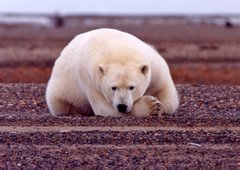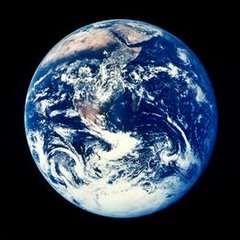Ten ways your family can save the planet
COMPASS: POINTS OF VIEW FROM THE COMMUNITY
LORI FICKUSCommentary
The legislatively appointed Climate Impact Assessment Commission held a public hearing in Fairbanks in December 2006. I heard commission member Caleb Pungowiyi of Kotzebue request personal stories of how global warming is affecting Alaska communities, and I was stirred to respond to his request. I began thinking of ways to get those stories to the commission.
I began by looking at what demographic I represented. I am a stay-at-home mom, and mothers can be a powerful collective force when advocating for their kids.My daughter is a beautiful Yupik teenager whose family ties originate in Kalskag. My son is the great grandson of the late chief of Arctic Village, Moses Sam. Both of my kids are born and raised in this state and are directly affected by adverse changes in climate. The past three summers I've had to take my kids out of state to escape the threatening air quality in Fairbanks caused by wildfires decimating Interior forests. I am sensing a threat to my children's future and quality of life, and I am compelled to act.
I decided to gather a small group of mothers and grandmothers from around Alaska, Mothers for Alaska, who are concerned about climate change and future generations. We answered Mr. Pungowiyi's call for more personal narratives at the commission's public hearings yesterday and today in Anchorage.Mothers for Alaska members are experiencing dramatic changes in our communities, such as forest fires, insects killing millions of acres of trees, threatened animal populations, flooding, severe erosion and loss of lifestyles.These alterations to our ecosystem will have the most impact on our children and future generations. Like a mother polar bear, we moms have an inner mechanism to protect our young. We sense a pending crisis that will damage our children's quality of life, and we cannot help but take action to protect them.
What kind of future will our youth face? What will it have to offer if we do nothing? Will generations to come be able to subsist from the Chukchi Sea? Will they hike the backcountry of the Interior? Will they be able to fish in the Yukon River? Will tourists still come to the Southeast?
My hope is that the commission will listen intently to what the Mothers for Alaska can teach them and then report back to legislators the urgency of this crisis. Alaska should not pose passively as the global warming poster child. Instead, it should move forward as an innovative leader. It should set an example for the nation, for the world, and protect this place with legislation, corporate and individual action, and utilize Alaska's vast renewable energy opportunities. Our senators in Washington, D.C., must support the strongest emission regulations and caps and renewable energy legislation.Global warming is the result of an extreme excess of carbon emissions from humans. We need to reduce these emissions to slow it down and reduce the harmful effects. Scientists tell us there is still time to act.
Start locally in your home with your family. For parents, here is a list of 10 things to do as a family to begin to create change.
* Drive less; walk or bike with your kids to do your errands.
* If you must drive, car pool.
* Don't leave your car running while waiting in line to pick up your child from school.
* Pack a waste-free lunch. Use reusable containers, utensils, cups and cloth napkins.
* Teach kids to compost kitchen scraps.
* Buy fewer plastic toys.
* Shop garage sales and thrift stores.
* Make it a habit from an early age to turn off the lights and electronics when not in use.
* Use the library -- the ultimate in reuse.
* Replace regular light bulbs with compact fluorescent bulbs. They save you money, and have a cool shape the kids will love.
Making changes to lessen your carbon emissions is not about losing your comfort level; it's about a smarter, healthier and money-saving lifestyle.
Take action.
Create solutions.
Generation to generation, what will your legacy be?













